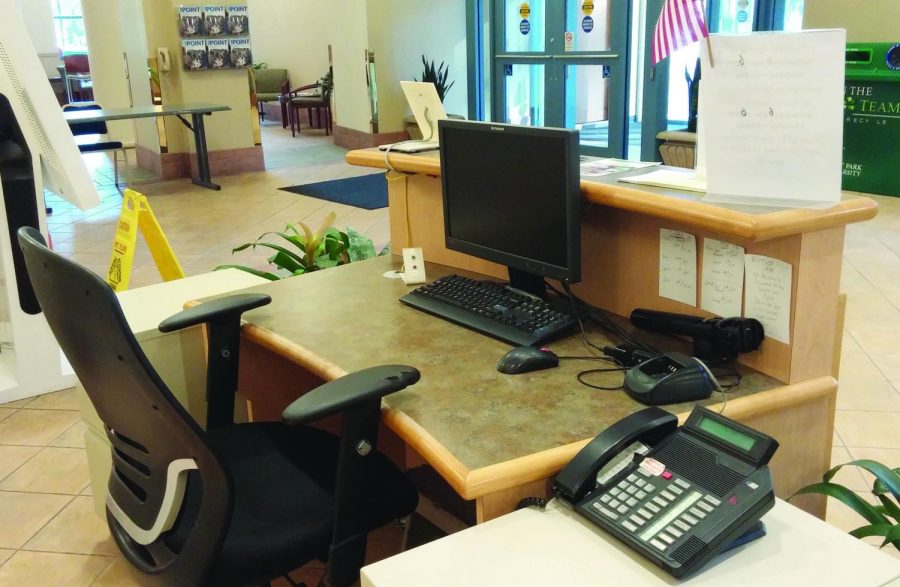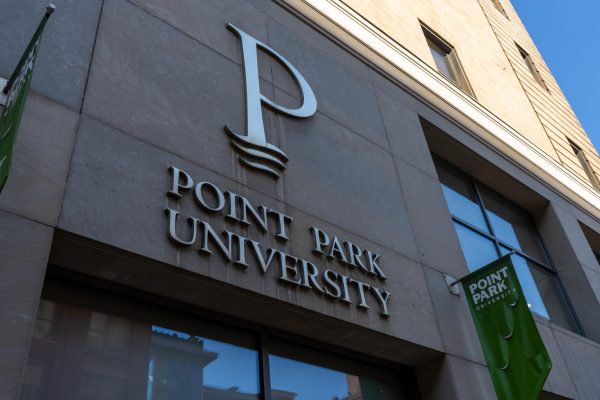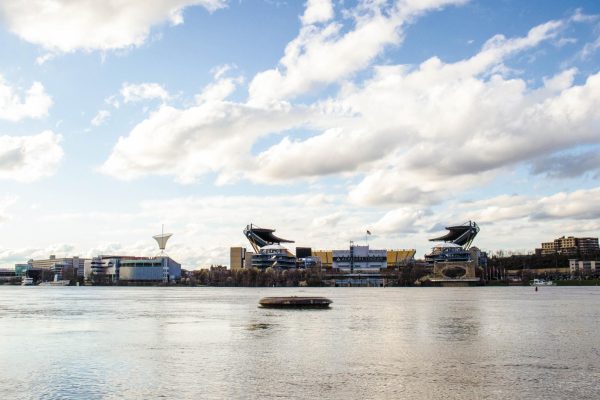Security presence spotty across campus
Photo by Mitchell Drake
The security desk in the Lawrence Hall Lobby stands empty during daylight hours. Security guards check IDs around the clock in Academic Hall, but not in any of the other buildings on-campus.
October 2, 2018
Across campus, there is a visible inconsistency in the placement of security personnel at the
front doors.
Academic Hall has security personnel posted around the clock to enforce mandatory ID check-ins at the front door entrance.
Lawrence Hall and the University Center Library only appear to have security posted from night until morning, whereas West Penn rarely ever has security personnel posted at
the doors.
Assistant Vice President and Chief of Police Jeffrey Besong administrates Point Park Police and security across campus. Besong offered a straight-forward explanation for the different patterns of security personnel at Academic Hall.
“Academic Hall is the only public building that is open during business hours,” Besong said in a phone interview.
“But Lawrence Hall is a different situation,” Besong said. “All dorms including Lawrence Hall have a desk attendant from 6 p.m. to 6 a.m. to sign in guests of students into the dorms.”
Lawrence Hall houses a larger number of students than Thayer Hall – which is accessed by entering through Academic Hall – but only has one guard manning the front desk at night.
One of the security officers employed by Point Park, Tom Hardin, has served the campus for two years and is regularly posted at the night-shift desk at Lawrence Hall’s lobby. Hardin expressed he does not consider his job taxing but finds that some flaws may exist in the system.
The lobby of Lawrence is a room with many large windows, allowing people on the sidewalk to easily view inside. Hardin believes that if a delinquent saw a lone guard sleeping at the desk – as they may tend to do because of their twelve-hour shift – the outsider could have an open window to commit a crime or a possible break-in.
Hardin says this possible blind-spot was caused by a lack in security budgeting.
“I wish there was more guards, but it comes down to the budget,” Hardin said.
Hardin explained that he is employed by ISS Security Services and was hired out by Point Park to act as the “first line of defense” before Point Park Police are notified to an incident.
His company is separate from Point Park, meaning that Point Park must allocate a portion of its budget to employ services such as security personnel. Hardin expressed dismay at the imbalance of personnel.
“They need to get as much safety in here to prevent stuff from happening. If they need to spend a few dollars, then do it. Children’s safety, that’s what our jobs are about,” Hardin said.
The University Center usually has no personnel posted at the door until night-time, approximately 10 p.m. Besong said that the current situation is
functional.
“The outer door of the University Center is card access and there are staff members working the front desk,” Besong said.
Students that frequently use the library, such as freshman Behavioral Science major Andrea Christian, are concerned with the placement of only one guard at night. Christian frequently stays at the building as she works late at U-View, Point Park’s on-campus TV station. She believes that security should be equally distributed as much as possible through each of the
buildings.
“During the day, I feel pretty safe. At night? Not really,” Christian said.
Christian also showed concern over the beige Metis Secure Emergency Warning System call boxes placed around various location around campus. These boxes allow direct, two-way communications between students and campus emergency services through a built-in speaker and receiver. Metis call boxes have been placed at critical places yet lack the eye-catching red color of most fire alarms or emergency phones. Along with a few friends, she never knew they existed until recently.
“We definitely need something noticeable and flashy; those boxes are not noticeable enough,” Christian said.
Hardin also expressed concern with the non-manned hours of the library, noting that the card scanner posted before the metal detectors is not doing much since no trained security are usually posted to enforce its use.
“We wish we could be there at all times,”
Hardin said.
Besong confirmed that the indoor card scanner will be removed, stating that the front door’s card scanner will suffice for the time being. Without security to enforce students to scan in, the card scanner has become redundant due to the front door’s scanner only feet away and will eventually be removed.
















